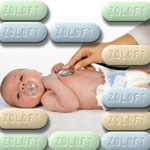Utah Couple Blames Pfizer for Daughter’s Ventricular Septal Defect
 A Utah couple filed a new Zoloft birth defects lawsuit on February 26, 2013. The case is proceeding in the U.S. District Court for the Eastern District of Pennsylvania, the location of the current Zoloft MDL (multidistrict litigation). The plaintiffs claim that because the mother took Zoloft while pregnant, their child was born with serious heart defects. They blame manufacturer Pfizer, Inc. for failing to adequately warn of the risks of Zoloft during pregnancy, and allege that in early animal testing of the antidepressant, before it was sold for human consumption, Pfizer learned that the drug could increase the risk for birth defects.
A Utah couple filed a new Zoloft birth defects lawsuit on February 26, 2013. The case is proceeding in the U.S. District Court for the Eastern District of Pennsylvania, the location of the current Zoloft MDL (multidistrict litigation). The plaintiffs claim that because the mother took Zoloft while pregnant, their child was born with serious heart defects. They blame manufacturer Pfizer, Inc. for failing to adequately warn of the risks of Zoloft during pregnancy, and allege that in early animal testing of the antidepressant, before it was sold for human consumption, Pfizer learned that the drug could increase the risk for birth defects.
Plaintiffs in Zoloft birth defects lawsuit claim child diagnosed with VSD
According to their Zoloft birth defects lawsuit, the mother in this case was prescribed and took the antidepressant during 2010 and 2011. She claims that neither she nor her physicians knew about the risk for Zoloft side effects in children, and so she was instructed to continue taking the medication throughout her pregnancy.
On May 19, 2011, while she was still taking Zoloft, the mother gave birth to a baby girl, who was born with a ventricular septal defect (VSD). As a result, she was diagnosed with a heart murmur prior to her discharge from the hospital, was referred to a cardiologist, and required to undergo surgical VSD repair when she was only eight months old. The plaintiffs claim she continues to endure substantial medical care, procedures and treatment, and to suffer physically and emotionally from the birth defects allegedly caused by Zoloft.
The plaintiffs add that they, as well, as have incurred substantial medical bills and continue to suffer as a result of their daughter’s birth defect.
Pfizer fails to warn about risk of Zoloft during pregnancy
Despite the results of animal studies that indicated the risk of Zoloft during pregnancy, Pfizer has not warned pregnant women about the potential consequences, and instead, actually encouraged physicians to prescribe the antidepressant to women of childbearing age, women who were trying to conceive, and pregnant women.
The plaintiffs in this Zoloft birth defects lawsuit point out that in December 2005, the manufacturers of Paxil, an antidepressant similar to Zoloft, added warnings regarding the dangers of birth defects when Paxil is ingested during pregnancy. Yet Pfizer added no such warnings to Zoloft labels. Meanwhile, several independent scientific studies indicate that ingestion of the drug during pregnancy could create Zoloft side effects in children.
Studies indicate Zoloft side effects in children
In 2006, a study published in the New England Journal of Medicine reported a relationship between the use of selective serotonin reuptake inhibitors (SSRIs) like Zoloft during pregnancy and babies born with persistent pulmonary hypertension of a newborn. In 2007, the same journal published two studies showing that compared to babies born to women who didn’t take SSRIs during pregnancy, babies born to women who took Zoloft during pregnancy had a significantly higher risk of developing certain birth defects.
Another study published in 2009 (BMJ) found that children whose mothers were prescribed an SSRI in early pregnancy, particularly Zoloft, were more likely to have children with septal heart defects. Another study published in 2011 (Obstetrics and Gynecology) found that consumption of SSRI antidepressants during pregnancy increased the risk of ventricular septal defects.
Plaintiffs claim Pfizer failed to provide adequate warnings
The plaintiffs in this case also note that in 2005, the FDA issued a warning letter to Pfizer, citing it for omitting risk information about Zoloft and for placing advertisements for the drug that were false and misleading to the public. The couple brings counts of negligence, design and warning defects, breach of warranties, fraud, negligent misrepresentation, and unjust enrichment.

